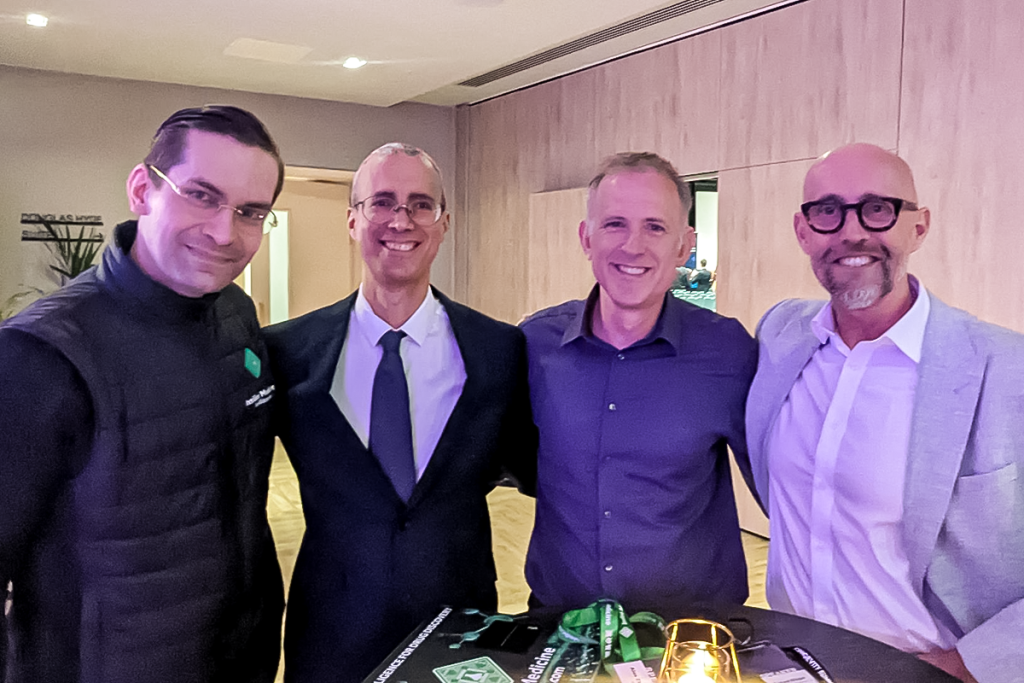A quick calculation (four full days of talking about longevity from 8:30am to at least 6pm) shows that Longevity Summit Dublin clocked in at over 30 professional hours of keynotes and networking. The summit was packed with attendees forging connections and hatching plans to drive the longevity field forward and Martin O’Dea, CEO of Longevity Summit Dublin and leading geroscientist Aubrey de Grey, were omnipresent, ensuring that everyone felt like they belonged.
There were so many top drawer speakers and interesting presentations, that it is impossible to mention everything, but I am hoping to give you a flavor of what a cracking experience it was – to find out for yourself, make sure you join us next year!
DAY 1
Longevity Summit Dublin 2024 kicked off with the theme of the intersection of AI and longevity, reflecting on how this intersection can both democratize and accelerate longevity therapeutics and interventions. We heard from John Sheehan, Dr Michael Suk, Jasmine Smith, Kennedy Schaal, Sally Ann Frank, Tom Lawry and Shavini Fernando.
Next, the event switched scale from macro to micro, focusing on lipids and protein damage, their implications in aging, and what to do with them. Free intracellular cholesterol, which human cells cannot degrade, accelerates the aging rate and is the target of Repair Biotechnologies’ work, as presented by CEO Reason. In a similar manner and theme, Matthew ‘Oki’ O’Connor enriched the audience’s knowledge by introducing his company Cyclarity’s approach to targeting oxidized cholesterol. However, the levels of cholesterol can be leveraged to improve longevity diagnostics – Max Unfried presented the biological aging clock based on lipids, which are actionable molecules. Currently, there are no large datasets with labels for aging; in his research, he used the existing disease-centric datasets and separated aging parameters from disease, thus creating a database for lipids and aging.
Aaron Cravens from Revel Pharmaceuticals provided updates on their phase 1 trial of a drug developed with their EAGLE (Enzyme-Antibody Glyco-Ligand Editing) platform. While Yuvan Research was the youngest company in this session, it impressed the audience with a strong vision for its ‘young plasma’ rejuvenating strategy.
The concluding part of the day focused on the rate of aging. The audience heard from Wacław Kroczek and Ben Meyers about semi- and supercentenarians. How do they get to this age? Semira Gonseth argued that first, one needs to know what lies ahead, which is possible with genetic testing, while Natalie Coles went a step further, presenting on stem cell regeneration.
DAY 2
Suitably refreshed, the attendees were ready for another longevity-focused day. Francesca Ranieri, Michael Ringel, Sebastian Brunemeier and Todd White started proceedings by exploring the funding and entrepreneurship sides of the longevity industry, concluding with a panel with Marc P Bernegger and Kenneth Scott. Alexander Fedintsev, Lynne Cox, Andy Lee, and Luisa Georgina Bâcă covered strategies that can combat senescent cells. But what if we could prevent cellular senescence from appearing at all? Following hotly-anticipated speech by Peter Diamandis, Manuel Serrano aimed to answer this question in a riveting session that had the audience in the palm of hand. His research aims to find pharmacological and nutritional interventions in cellular reprogramming: rejuvenating cells before they reach senescence.
Next, Alejandro Ocampo from Epiterna added on the topic of reprogramming and epigenetic dysregulation as a driver of aging. He highlighted that the cyclic implementation of Yamanaka factors expression extended lifespan, but when administered continually, they induce hepatic (liver) and intestinal failure.
Evan Snyder’s presentation focused on another type of cell: neurons. He highlighted hypersynchrony (abnormal simultaneous firing of neurons) and its relation to brain pathology, such as neuroinflammation. He emphasized that hyperactive neurons produce hypoactive networks, which are present in almost all neurodegenerative diseases. The key to brain-healthy aging is preserving networks. Alessandro Maggi presented the intraspinal probe fabrication that can be used for neural stimulation. Tested in mice, it performs well on sensory and proprioception mapping, and can be part of biotech devices used, such as in bladder control.
Catlin Lewis presented the latest data from the cross-sectional, longitudinal study ‘robust mice rejuvenation’ from the LEV foundation. The four tested interventions are rapamycin, bone marrow transplantation, telomerase gene therapy, and senolytics. The interim findings say that combinations performs better than single interventions, except rapamycin, which still stands the strongest.
Patrizia d’Alessio also covered rejuvenation, but unlike RMR, she focused on natural molecules. Specifically, she presented on reversing cell senescence, especially SASP secretion with botanical non-toxic molecules found in rain forest plant saffron heart (Halfordia kendack) and monoterpene d-limonene, a small molecule found in citrus peel.
Day 2 rounded off with a panel featuring Phil Newman, David Barzilai, Jennifer Pearlman and Aubrey de Grey. The panelists covered female-centric approaches to longevity and combating misinformation, as well as discussing just how crucial funding is. The panelists agreed that increasing funding for aging research and longevity medicine would be significantly more effective for lifespan elongation than existing healthspan interventions.
Read Dominika’s round-up of Day 3 and Day 4 HERE!

About Dominika Wilczok
With a background in using AI for early Alzheimer’s detection, advocating against ageism, and establishing an NGO centered around Healthy Longevity, for 5 years, Dominika has been working to close the healthspan-lifespan gap. Her current work encompasses longevity medicine, and AI-driven approaches to end aging, and you can watch her TEDX talk on longevity medicine, aging research and AI HERE.


